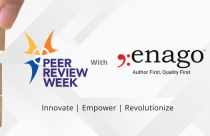Revolutionizing Research Discovery: An Interview With Sparrho

Discovering and tracking the latest research can be overwhelming tasks, even for senior researchers. With the increasing number of articles that get published each year, keeping oneself well versed with the newest developments in the field is becoming more and more time-consuming. Thankfully, advances in machine learning and natural language processing has helped to simplify this process. Sparrho is one such platform with a mission to help researchers stay on top of the latest publications across all fields of science via dynamic feeds and expert-curated pinboards.
Sparrho utilizes artificial intelligence in combination with human intelligence to suggest personalized recommendations for research articles from over 45,000 journals. Researchers can then save or pin these articles to their “Pinboards” for future reference.
As part of our interview series on Connecting Scholarly Publishing Experts and Researchers, we had the opportunity to speak with Dr. Vivian Chan, CEO and co-founder of Sparrho.
How is Sparrho different from other search engines? What are the main benefits it offers researchers?
Sparrho encourages its expert users to curate research articles in their own public collections (pinboards) and write short summaries that explain why these papers belong together. This new experience taps into the unique ability of humans to make unexpected connections between research studies in different fields. The result is a new way for experts as well as newcomers to explore the literature and hear directly from researchers.
Can you share some Sparrho-related vital statistics that our readers might benefit from?
We currently index over 60 million articles and patents from over 45,000 journals and other preprint servers and sources across the web. In addition, we also have 350,000 active users per month worldwide and our numbers continue to grow!
What is the success of adoption and the impact that this service has had especially in markets like Asia? How does Sparrho cater to such an audience?
Our platform is currently free to use globally, driving uninhibited growth in our international audience. In November, our fastest-growing regions were all outside of traditional research and development hubs: topping the list were Western Africa, Central Asia, and Eastern Europe. We continue to have a high impact in East Asia in particular, with many of our early-career researcher prize winners and shortlisted scientists hailing from this region.
What are some of the initiatives being taken to broaden the scope of partnership with publishers, research libraries, and organizations?
At Sparrho, we support open science and those who practice it. Our recent talks at the 2017 SpotOn (Science Policy, Outreach and Tools Online) Festival marks our passion for the advancement of the open science movement, key to our central mission of democratizing science worldwide. We also have a number of exciting partnerships lined up for 2018 – so watch this space!
Earlier this year, Sparrho started offering travel grants for PhD students and postdoc researchers through its Early Career Researcher Prize. Could you share some insights on this Prize and its selection process?
We want to ensure that researchers from all countries are able to disseminate their work to the scientific community, as the value of any science increases exponentially when it is shared. Our prize offers early career researchers the chance to win £500 towards attending a conference of their choice anywhere in the world. Recent winners have presented in Mexico, Japan, and Germany.
Each month, we choose the best pinboards created by researchers on our website about an aspect of their current research. To be in the running, the pinboards must demonstrate skillful and engaging communication of complex scientific concepts, as well as an enthusiasm for science and its applications. This demonstrates the researchers’ ability to write about their work clearly and concisely. Such an attribute, we believe, is crucial for the development of a scientific landscape that is accessible to everyone.
Welcome to Sparrho from Sparrho on YouTube
In July 2017, Sparrho received funding of $3 million. How has this funding helped in the development of Sparrho?
The main thing we’ve been focusing on is building our team sustainably and sensibly. Since September, five people have joined our team—among them experts in Clojure and systems design, commercial and B2B sales, and communications—and we’re looking to keep expanding in the New Year.
In your opinion, how is technology changing the landscape of academic publishing and what are some of its challenges?
The Internet has enabled instantaneous, low-cost dissemination of content. However, with more and more information available and increased multidisciplinary approaches to academic research, the problem becomes that of finding needles in ever-growing haystacks. Academics have, in some ways, been spoilt ever since the 1990s with digital publication formats, electronic databases, and a concerted effort by innovators across the academic, publishing, and technology communities to build increasingly sophisticated tools (400 and counting, according to this study by librarians Bianca Kramer and Jeroen Bosman of Utrecht University).
But one of the biggest leaps forward was the development of automatic indexing and refined search algorithms, the combination that propelled Google Scholar forward after its launch in 2004. The frontier right now is how to harness human intelligence at scale and combine this with machine learning algorithms to enhance the accuracy of computer-generated recommendations. One caveat that we are aware of is that the existing literature is our biggest and richest dataset for training recommendation algorithms; however, it also suffers from a bias towards fields and populations that historically have had more academic interest.
As the CEO & co-founder of Sparrho, what inspired you to launch Sparrho? How did you embark on this journey?
I completed my PhD in Biochemistry at the University of Cambridge in 2012 and soon began to notice the huge difference in accessibility to many things I had taken for granted at Cambridge. Even simply going from having Wi-Fi everywhere in the town to having to find a cafe with Wi-Fi when I wanted to work was a shock. More importantly, the scientific information—research, journals, and articles—that I had been so used to accessing during my PhD was no longer available to me. I took that problem and combined it with inspiration from a postdoc in my lab, who’d suggest personalized reading lists every week to our lab group, to come up with Sparrho. I then met my co-founder at Entrepreneur First, a start-up accelerator based in London, and the rest is history. I’m driven every day by the desire to make a positive impact in the world and to connect with other smart people in order to solve hard problems.
What advice would you give to young researchers wanting to contribute to publishing innovations?
Find a problem that affects a large enough number of people so that it’s worth your time trying to solve it. Look to the open science movement for inspiration, as it’s where the future lies. Start by contributing to existing start-ups and helping them develop innovations: there are already a lot of start-ups out there working on problems in the publishing industry. Perhaps that’s where you’ll find the idea that’ll drive the next publishing revolution!
You can check out the Sparrho website and also follow them on Twitter @sparrho
It was a great pleasure to talk to Dr. Vivian Chan. We sincerely thank her for taking the time to be part of this interview and also wish the entire team at Sparrho all the very best in their future endeavors!
(This interview is a part of our interview series of Connecting Scholarly Publishing Experts and Researchers.)









